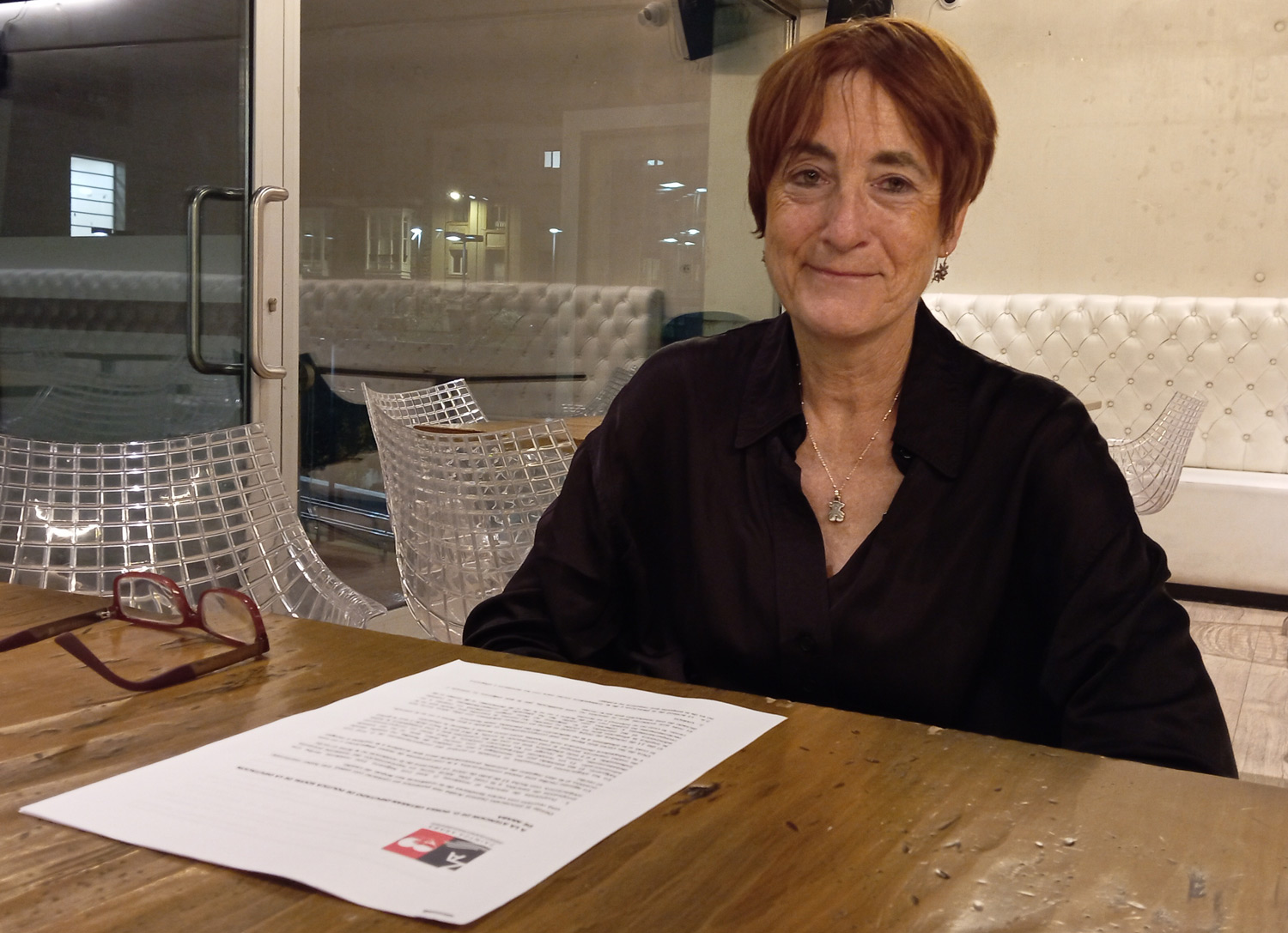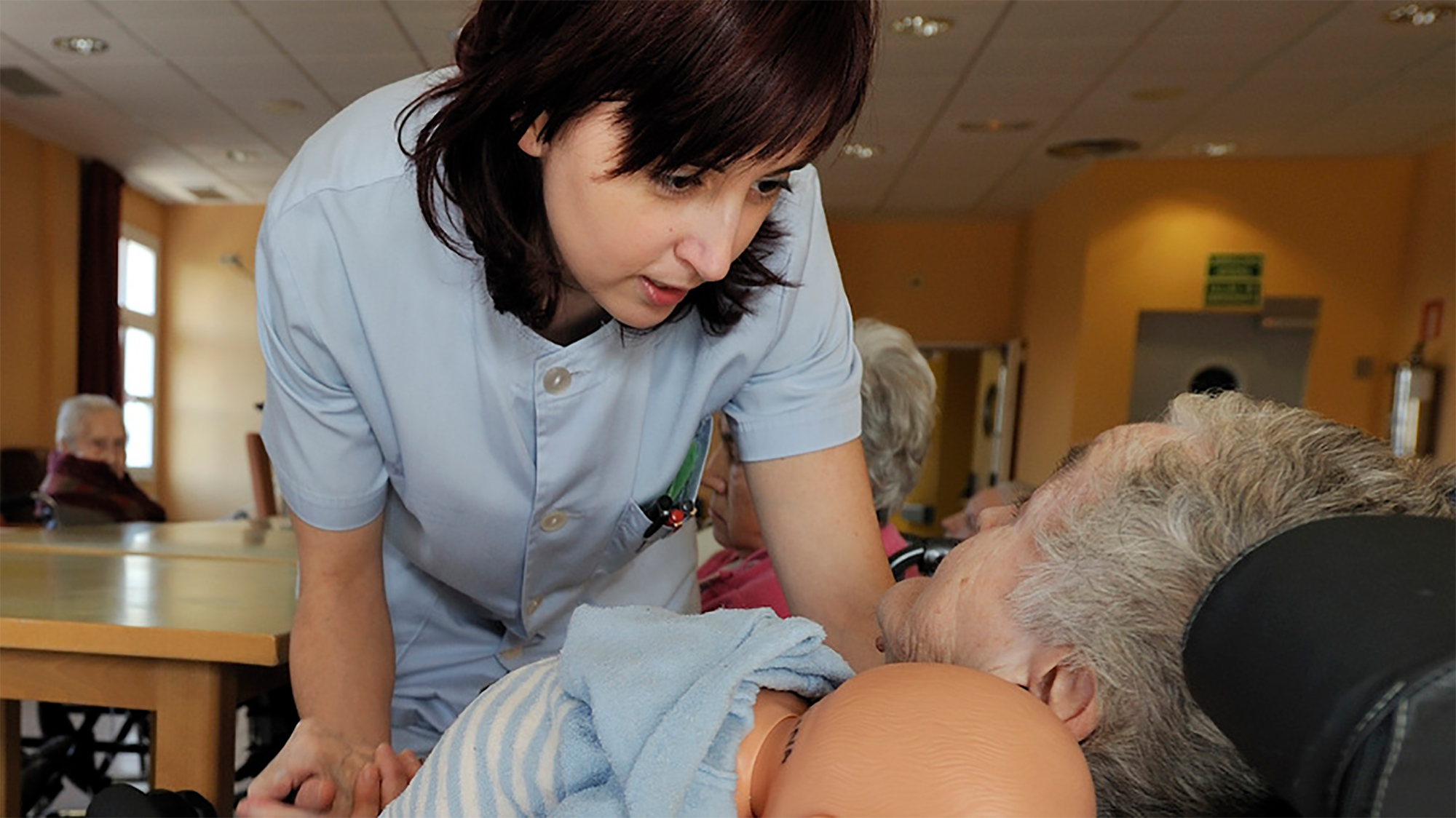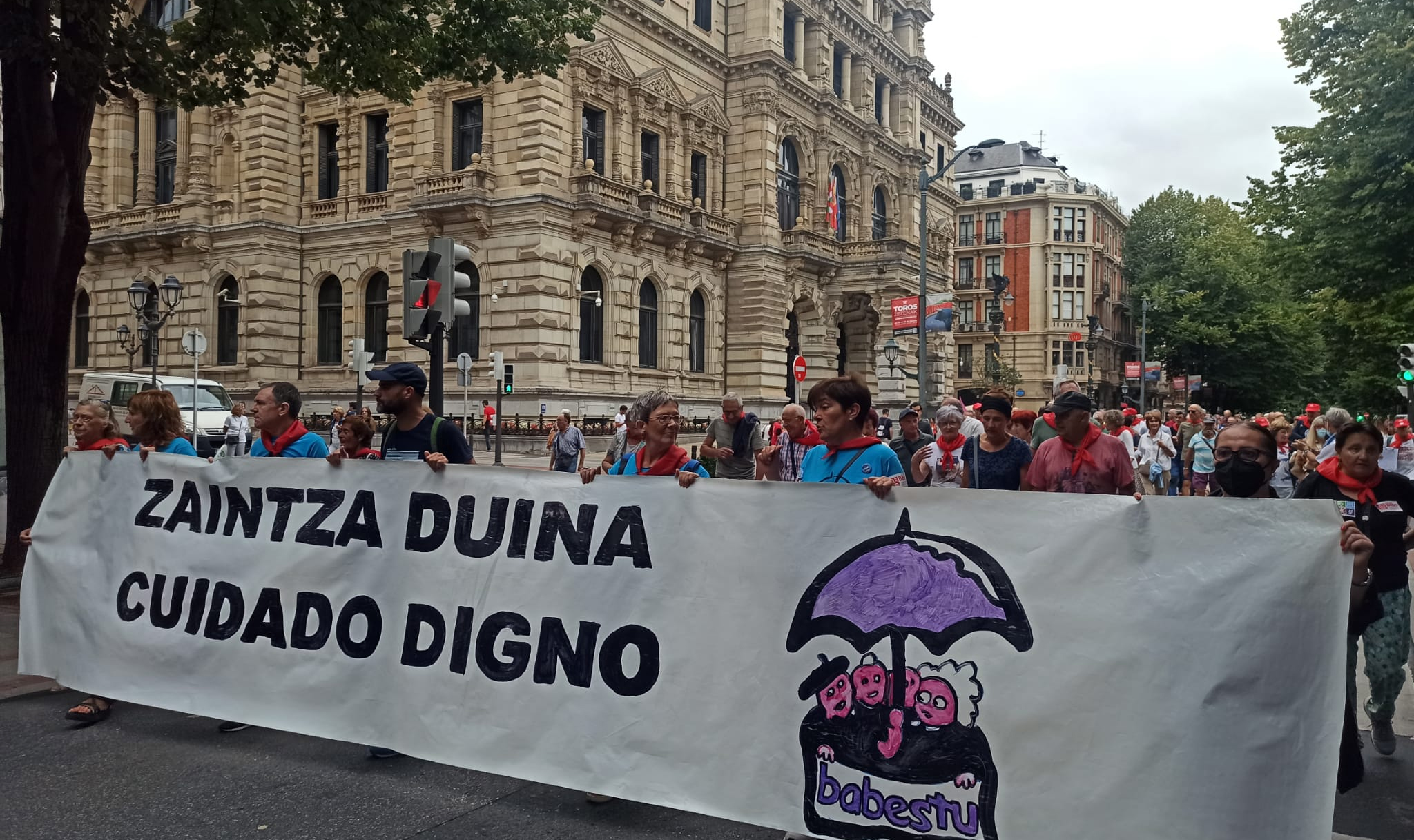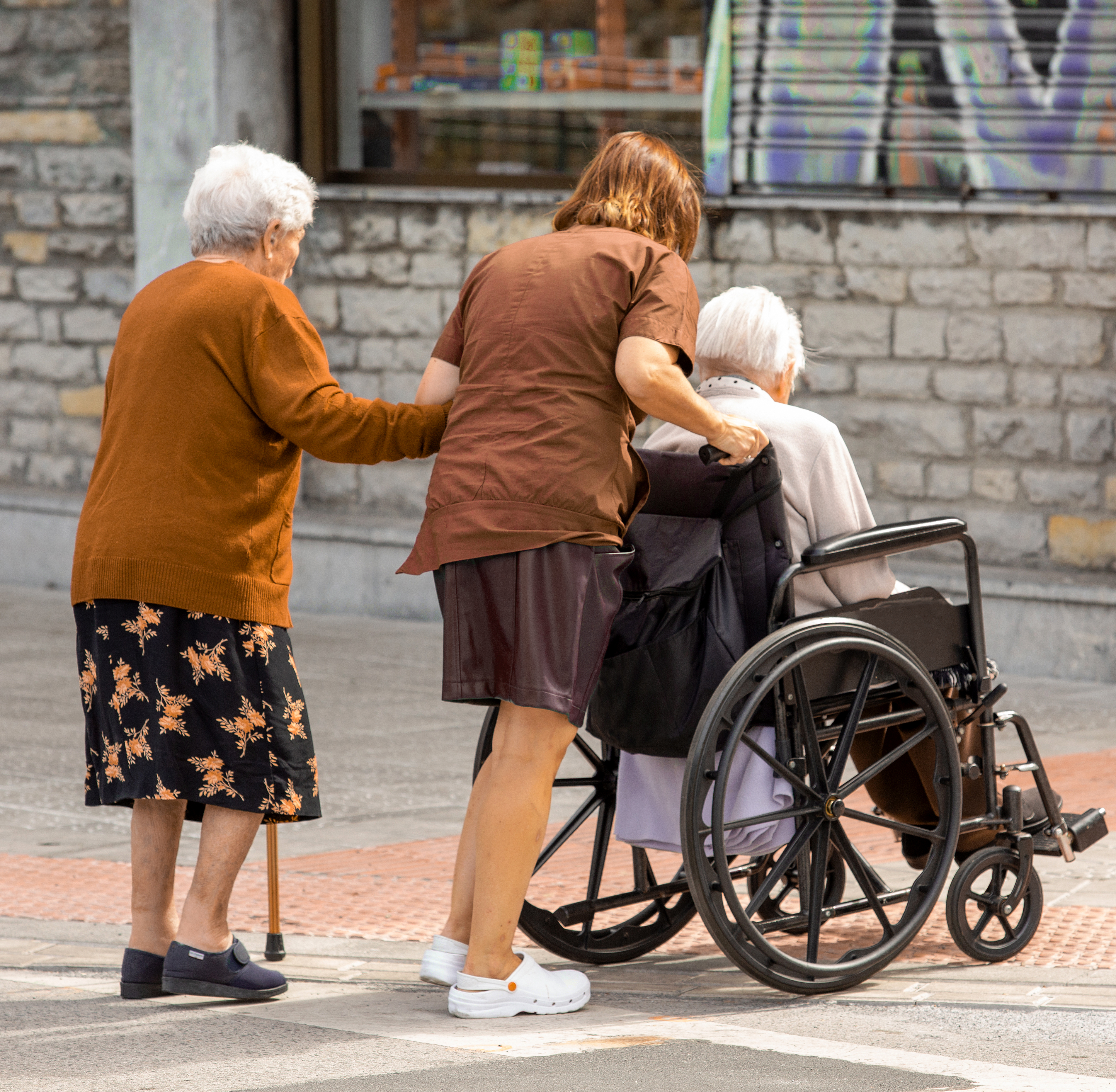"Entrepreneurs in nursing homes have anonymity and impunity"
- Investigative journalist Ahoztar Zelaieta Zamakona has published his ninth book with the editorial Txalaparta: Residences S.A. The care business in Euskal Herria (Residencies SA. The care business in the Basque Country). It has detailed the privatisation of the residential sector over the past 30 years and, once again, has highlighted the links and interests between private companies and public administration.

Workers in nursing homes have been struggling in recent years, demanding decent working conditions for employers, among others. You have tried to name and surname the employer in this work. For what purpose?
There was talk of employers as if it were a building, but the employers are a number of people. In other words, decisions are not made by the employer, but by the employer. But public opinion didn't know who they were, they were stealing information from us. Employers of employers have, besides anonymity, impunity, because the public administration joins them. Women who struggle often do not know whether they are negotiating with the public administration or with the employers, because they are quite dissolved.
My contribution has been to make an aerial photograph of the employers, to show which are the most important employers in the Basque Country and Navarre, and what names and surnames are behind them and what links they have with the public administration, especially with the people who have led social policies.
He's making presentations of the book in several localities. What response have you received?
It's my ninth book, and I've noticed some differences. On the one hand, I have seen a very mobilised sector: workers, associations of family members, pensioners ... I have received many invitations from you to present the book. On the other hand, in the youth centres I have not been as successful as with other books, and the elderly have complained about it. It has been interesting to see how society is mobilized and what issues generate more empathy.
Those involved in the theme of nursing homes are, in general, very victimized by institutional abuse. I have noticed them outraged and frustrated, because they do not see the situation changing in the short term. In 1991, only 9 per cent of nursing homes belonged to private companies, and currently only 9 per cent are fully public. To turn the slope around is very hard and the people who have been in this fight for some time are tired. For them, this book is an impulse, a tool. I share your demands: the sector needs to be published, and in the meantime they need dignified agreements to provide quality service to the elderly.
On the road to publication, is what they did in Gipuzkoa with Kabia effective?
The story of Kabia is very long, but in short: When Bildu was in the power of the Council of Gipuzkoa (2011-2015) there was a law that said that deputies had to assume the responsibilities of the residences of elderly people who were in the hands of the municipalities. In addition to complying with the law, Bildu had a project to publish its headquarters and turn workers into officials. But it was very difficult to reconcile the chaos at the time: some were officials, others were those who for many years were chanting contracts, those who were on the payroll of private companies but who were in public offices, the subcontractors ... Kabia was created to unify all workers and publish the sector.
In 2015, the deputy took the PNV again and decided to continue with Kabia’s project. But what did they do through the back door? The management of many of the residences that were part of Kabiara was allocated to private companies, including the Biharko group. What the PNV has done with Kabia has not been reasonable, because it is contrary to the initial objective. It was a pity.
"In Pandemia, what was expected happened, and that does seem serious to me."
In the book he has focused on deaths in homes from COVID-19.
There have been many victims. Since the 1990s, the Ararteko and the Ombudsman of Navarra have been warning of poor housing management, and the pandemic has now revealed all the weaknesses of the sector. I wanted to know how many people have died in nursing homes to make comparisons, but the administration doesn't want to break down the data. In the end I have obtained figures through the journalist of Iker Rioja Eldiario.es and from the information of the workers, family members and politicians; the data is there, each one will draw its conclusions.
However, it was more important for me to show what public administration knew about residences before the pandemic disaster. I have learned that in most cases they are notified beforehand of house inspections, and yet the Biharko and Protect teams have received fines; imagine what serious things happened to impose fines. And the Administration did not agree to the provisional closure or the judicialization of these centres.
Is it possible for your public administration to intervene there?
Of course, they had all the power to do something, because they're related to sanctioned companies. The workers have been denouncing for years but have not listened to them. In Pandemia, what was expected has happened, and that does seem serious to me. The Basque Institute of Criminology recognized in a 2005 report the existence of institutional abuse in residences, and the administration knew it. If this had happened in childcare facilities or even in prisons, it would be a huge scandal.
If what has happened in the residences of Pandemia had happened outside Euskal Herria it would be a scandal, but being with our companies nothing happens. Here the former leaders of the PNV and the former social policy positions get tremendous contracts and we accept it. In the presentations I see faces of wonder, people don't expect it to be that much. In Euskal Herria, we believe that all evils come from the outside, and we don't look inside.
"The public administration has stopped investing in the sector and has left this responsibility in the hands of private companies or reached agreements"
For us, he pointed out that the privatization of nursing homes occurred between the years 1991-2007. Why?
By delegation of the Public Administration to private companies. On the one hand, because in the capitalist mentality it is considered that privatized services are better, that there are better professionals, and that it helps the administration to assume the costs and responsibilities of these services. But the reality is quite the opposite: private companies have to make money to take on that responsibility and, therefore, reduce the quality of service. On the other hand, there are interests behind it, because private companies have a direct influence and relationship with those who allow them to enter the public sector.
There has been a modus operandi in which the public administration has stopped investing in the sector and has left that responsibility in the hands of private companies or has reached agreements. To succeed in this market, companies have been doped, with two injections of public money: one, that most private residences are arranged, and two, that complete services or residences are managed in public owned residences.
Public nursing homes in Hego Euskal Herria
Álava: 94 to 8 public.
Biscay: Out of 155 residences, 4 public.
Guipúzcoa: Of 65 residences 16 belonging to the autonomous body of the Diputación de Kabia, but the majority managed by private companies.
Navarra: From 71 to 2 public.
You explained that the housing companies in Navarre get an annual profit of EUR 100 million, and the housing management in Bizkaia, GESCA, says it has EUR 130 million. How is it possible that it's so profitable?
They play with ratios to get benefits. They get a profitability of 20-25%, very difficult to achieve on the market. But they have competitive advantages because they are the best client of public administration and demand is very high. They receive an amount of public money and in turn measure costs as free companies, offering the least service to their customers and paying as little as possible to their employees.
It has also analyzed the revolving doors between the companies of nursing homes and the public offices of the PNV. What advantages do revolving doors offer?
The concept of revolving doors is fairly distributed. It does not mean that a politician then works in private enterprise, and that what has been in private enterprise then goes into politics. There, many concepts are hidden and many universal rights are broken, such as equal opportunities for competitiveness, because some have advantages in accessing public contracts. There's clientelism.
Employers, local and foreign companies have hired politicians who were running social policies in the Basque Country. They have left the job and have got to work for the employers or for private companies, and they have passed a lot of information on that bridge. In addition, some diners had privileged information about the direction of the sector and, knowing this, they have created private companies to occupy much of the pie. All of these companies are rooted and work together.
Why have companies come from abroad, already from here?
Because you've seen a business opportunity. In fact, in addition to the residential sector, local companies manage home care, child care, etc. Your fan business is so big that you don't need more. Large external companies have seen that more services are needed, because there are more and more customers and the public administration does not want to invest in the sector. In addition, they have been able to use the modus operandi here, creating alliances with the companies of the leaders or hiring the leaders of the PNV, such as CASER.
Employers and major networks
Álava: Employers CREA/AEZE, 45 residences in Álava. Albertia, Mikelats, New Construction Activities, Geriatric Care Iruña, Aitona Etxea, Tagore, Murua...
Biscay: The employer GESCA, the Protect group, is the largest. 42 CAPV residences, premises (Protect, Urgatzi, IMQ-Igurco, Naguspea...) and exterior (Domus, Caser, Vitalia, Orpea, Sanitas, Adriano Care...).
Guipúzcoa: Patronal GARA, 10 sites in Gipuzkoa. Tomorrow's team is the largest.
Navarra: The patrons LARES and ANEA have control of 64 out of 71 residences. LARES patron saint of religious institutions, 39 residences in Navarra and 32 at the CAPV. Employers of private companies ANEA, 25 locations in Navarra. It has half of the places of nursing homes, with local and external operators. Idea, Amma, Solera, Elizondo, IMQ-Igurco, Setenase...
Urkullu has on many occasions called for the public-private partnership that is at the heart of the capitalist system, but without any intention of explaining what that connection is today. When the public is complementary and dependent, it cannot oppress the interests of the... [+]
The images that the metal sector strike has left in Bizkaia in the last two weeks are once again spectacular. There are those who talk about the end of the labor struggle, nostalgia for the Euskalduna times, but the reality is that the number of labor conflicts in Euskal Herria... [+]
























